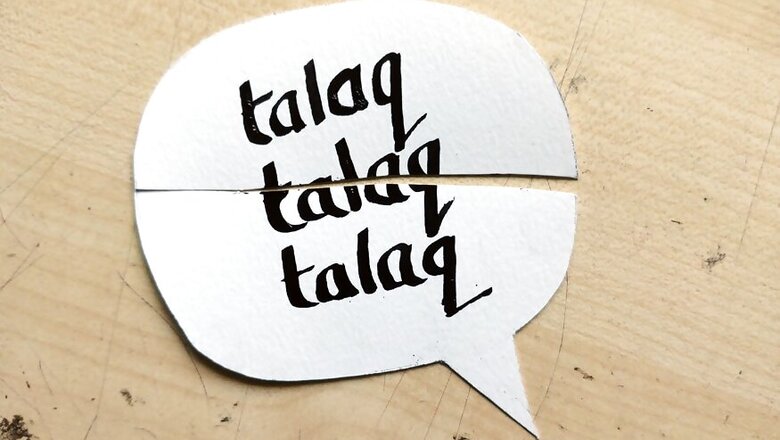
views
New Delhi: The Triple talaq bill has been tabled for a discussion in the budget session on Friday, where the decision to introduce it as a fresh bill in the Lok Sabha could be taken.
The bill had lapsed as it was introduced in the lower house of the Parliament and was pending in the Rajya Sabha, when the 16th Lok Sabha was dissolved last month. Bills that are introduced in Rajya Sabha and are pending there do not lapse with the dissolution of Lok Sabha. Bills passed by Lok Sabha and pending in the Rajya Sabha, however, lapse.
The Previous Narendra Modi-led government had promulgated the triple talaq ordinance twice. A bill to convert the earlier ordinance, issued in September 2018, was cleared by the Lok Sabha in December and was pending in the Rajya Sabha. Since the bill could not get parliamentary approval, a fresh ordinance was issued in the February this year.
The bill against Triple talaq has been facing stiff opposition from in the Rajya Sabha, where NDA doesn't have the sufficient numbers to push the legislation. The opposition has raised several objections to the provisions that award a three-year jail term for the husband for divorcing his wife through instant triple talaq.
Earlier, the Modi government had tried to include the views of the Opposition by adding provisions of bail for the accused during trial. While the ordinance makes it a "non-bailable" offence, an accused can approach a magistrate even before trial to seek bail.
To better understand triple talaq and Islamic jurisprudence terms like Talaq-e-Sunnah, News18 has prepared an explainer.
What is triple talaq?
First, before understanding what triple talaq is, we must understand what a ‘Nikah’ (Marriage) stands for in Islam. Nikah is essentially a contract laid down in a ‘Nikahnama’ drawn between the husband and the wife. This contract can have conditions and has a compulsory ‘consideration’ (Meher) to be paid at the time of the marriage. This consideration is paid by the man to the wife, and can be at time waived off by the woman as per her own will. So the basic difference between a Hindu Marriage and a Muslim Marriage is that for Hindus, marriage is a divine sacrament whereas for Muslims, it is contract drawn between the husband and the wife.
So, to explore the question of triple talaq, one must understand that in Islam, everything is followed as per Sunnah (Deeds of the prophet). Hence, most Muslim women bodies opposing 'triple talaq’ want the Muslim bodies to adopt ‘Talaq-e-Sunnah’ (Divorce as per the Prophet’s sayings and Quranic dictation) and discard ‘Talaq-e-Biddah’ (a diluted form of divorce which propagates instant cancellation of marriage).
What is Talaq- e-Sunnah?
According to the Prophet’s sayings, giving “talaq” to a wife in a fit of rage or anger is strictly prohibited. The Quran advises the husband to settle the differences through a mutual conversation as the first step. This step is known as the Fa’izu Hunna. If the differences continue between the husband and the wife, the parties should refrain from any conjugal acts till they settle their dispute. This step of physical separation known as the Wahjuru Hunna is prescribed so that the couple re-unites. However, when this step fails, it is recommended that the husband must attempt to talk to the wife, make peace with her and talk about the gravity of the situation. The third step is known as the Wazribu Hunna. However, the Quran advises that even if the third step fails, the fourth step of ‘arbitration’ must be followed. In this step, a member from each of the spouses’ family is present and the parties try to make amends in the strained relationship.
It is only after the failure of the four steps that a husband pronounces the first talaq. The husband has to compulsorily wait for a wife's “iddah” (menstruation) to complete before pronouncing another talaq. Not more than two talaqs can be pronounced during the course of iddah. Iddahs are considered to be the three monthly cycles. During these three months, a man cannot give his third talaq. This had been envisaged so that the couple sorts out their differences in this period. Quran prescribes that if a woman has attained the age of menopause then the period of iddah is three months, whereas if a woman is pregnant, then the period of Iddah would be till the child is born or the termination of pregnancy.
If the differences still persist, then the third talaq is pronounced, after which the relations between the husband and the wife are severed. Hence, the women groups who are claiming to revive this practice are only vouching for the fact that they get the maximum time to sort out their differences, which is often not possible in an ‘instant talaq’.
What exactly is ‘instant talaq’? How is it different from Talaq-e-Sunnah?
Instant Talaq is when women are divorced through an SMS or over a mere phone call. It is essentially ‘Talaq-e-Biddah’.
The term ‘Biddah’ means innovation and Muslims are essentially advised against introducing ‘biddahs’ in their religion. This practice of talaq was first promoted by Caliph Umar, but staunchly opposed by all the petitioners who have approached the Supreme Court for a reform in the case of triple talaq. However, the Muslim Personal Law Board has yet spoken on the issue and claims that this can be sorted out internally.
Dr. Asma Zehra, an executive member of the All India Muslim Personal Law Board, was questioned about this during a recent press conference and said, “We have left it for our Ulema (scholars) to decide what is best for us.” However, this answer is far from the truth, as something which is not mentioned in the Qur’an or is a part of the Sunnah can never be justified as a lawful act by a Muslim.
Can a man marry his wife after pronouncing the third talaq?
No. After the third talaq, a woman is supposed to marry another man, consummate the relationship and only after following the original procedure of Talaq-e-Sunnah, will she be able to marry the former husband again. This practice is known as the ‘Nikah Halala’, and many Muslim women have condemned this practice as barbaric and it assumes more importance, in case the talaq is given as Talaq-e-Biddah. Women have often described it as a barbaric practice and demanded its abolition.
Do the women have any right to divorce the husband in Islam?
There are broadly two methods under which a wife can claim divorce. One is Talaq-e-Tafweez and the other is Talaq-e-Khula. Under Tafweez, the husband ‘may’ delegate his power to give talaq to his wife or any third party. This right has to be in the form of a contract with conditions, like, ‘if a man marries again’ then there can be a divorce, etc. But a contract will not be without conditions or be absolute.
The second one is Khula. This is a divorce which is at the ‘request’ of the wife. In this case the woman has to make an offer of divorce to the man. The man must accept the offer with consideration, which often means the woman has to give back the Meher taken during marriage. After these two steps, a Khula is granted. The woman often approaches a Qazi-court as well to demand a Khula from the man. There needs to be an execution of a Khulanama.
But something which needs to be broadly observed is that in both the cases, it’s only a request or a husband's wish to draw up a contract to give the wife an option to divorce him. Thereby, putting the husband first and maligning gender equality in this regard.

















Comments
0 comment